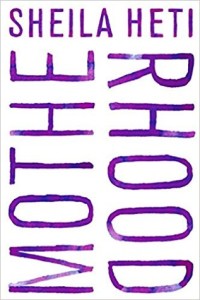Tag : childfree
September 27, 2018 by admin
When You Don’t Want to Be a Mother
“I think you’re in for a big burning,” a Tarot-card reader tells Sheila Heti, midway through her latest work, the semi-fictional Motherhood. At this point in the book, Heti is deep into the process of interrogating whether or not she wants a child. Is burning another word for “urge”? Or will it destroy her life? Is it necessary to destroy the life she has carefully constructed in order to get to another, better version, which may involve having a baby?
 Heti’s book, which reads like a loosely organized journal, is a strange thing to come upon if you are, like me, about to turn 40. My own evaluation of having kids was over by the time I was in my early 30s. (I’m not doing it.) But Motherhood profoundly echoes what it’s really like to forego propriety, which women do when we challenge the idea that having children will offer us absolute satisfaction.
Heti’s book, which reads like a loosely organized journal, is a strange thing to come upon if you are, like me, about to turn 40. My own evaluation of having kids was over by the time I was in my early 30s. (I’m not doing it.) But Motherhood profoundly echoes what it’s really like to forego propriety, which women do when we challenge the idea that having children will offer us absolute satisfaction.
Motherhood begins when Heti is 36, and ends on the cusp of her 40th birthday. In that time, she watches her body change—her once-regular period has started to vacillate, making her more frantic. All around her, her friends are having children and telling her that she should just do it. Heti has no desire for the maintenance of a child, she admits, but maybe that’s the only way she’ll repair the rift in her long-term relationship. Women do this all the time, apparently, according to her friends. A baby binds two people together as nothing else can.
“What if I’ve suppressed the desire for children so much that my desire is unrecognizable to me?” Heti wonders. In my copy of Motherhood, this line is underlined four times, and there’s a star in the margin in case it somehow managed to escape my attention. So much of the stickiness that comes with grappling with childfreeness, or anything that’s outside the mainstream, really, is considering the integrity of your own thoughts. Do you actually have the childbearing urge, but you’re ignoring it? Will it show up just in time for your fertility either to expire or become too much to deal with? And if it does, what will you do? Regret is the thing we’re supposed to be afraid of, regret that we missed out on the only experience we’re told will allow us to truly know love. And for a Jewish woman, descended from a Holocaust survivor, it’s compounded by an extra imperative: “Jewish women are expected to repopulate from the losses of the Holocaust. If you don’t have children, the Nazis will have won.” I have felt this… how can I imagine not having children, and selfishly contribute to our dying out?
You can’t undo it, though, the having kids. While Heti grapples with the fact that, without kids, without the traditional parameters of a life, it’s hard to measure success, she also fears losing the life she has made as a writer. Once you’ve gotten what you’ve wanted, do you cast it aside for something you only maybe kind of possibly want? Heti is not actually ambivalent about having kids. As someone who’s never been ambivalent, I’ll tell you: we can recognize our own. She doesn’t want children, which she admits, so the question throughout the book is really whether or not she’ll cram herself into a space where she genuinely doesn’t fit. There is a sturdy argument to be made that Motherhood isn’t just about deciding about the future of her womb, but about how we learn to mother ourselves. The relationship between Heti and her own mother exists in the shadow of Heti’s great-grandmother, who survived abject poverty and the Holocaust, and ultimately sacrificed her own future for her husband and children. Heti’s mother, a pathologist, marked Heti’s childhood with sadness that her daughter found mysterious, and Heti admits to being obsessed with redeeming her mother, looking for the source of that sadness, and freeing her from it, a task as impossible as it is foreboding.
Heti’s emotional state throughout the book is mercurial. She’s doing a lot of crying and fighting with her partner, and it’s not until she begins addressing her mental health issues with medication that things begin to calm down and she’s able to come to a final decision. It’s a solid turn from her previous stance of asking major questions like “What’s a better thing to steer your life by? Your values?” and leaving the answers up to the literal flip of a coin. Mothering ourselves means giving ourselves the best mother we can imagine, who tells us to pay attention to our instincts, to take care of ourselves, to be the architects of our own lives.
You don’t have to be questioning your childbearing intentions to engage with the relevance and power of Motherhood—anyone who’s ever had occasion to question the framework of normalcy as being rooted in the nuclear family can relate. If you happen to be in the tender space of realizing you don’t want what you’re supposed to desire the most, a word for how you might feel about this book is “grateful.”
Chanel Dubofsky is a writer in Brooklyn.
- 1 Comment
 Please wait...
Please wait...